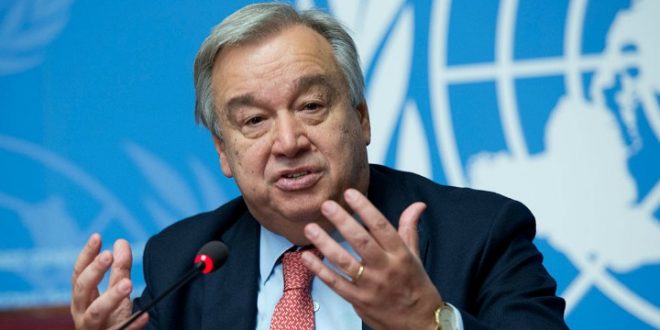International observers have raised concerns over the widespread human rights violations in various countries resulting from efforts to contain the spread of the COVID-19 pandemic.
Extreme measures adopted by countries over the last three months- from restrictions in public places, arrest, detentions, shootings, electronic surveillance, stigma etc- have been identified as major incidents of gross human rights violations.
International organisations such as United Nations (UN), World Health Organisation (WHO), World Justice Project (WJP), and Nigeria’s Human Rights Commission (NHRC) have criticised the handling of the pandemic in some countries in Asia, Europe, parts of the Americas, and Africa.
As of Saturday, May 16, the new Coronavirus had affected 200 countries with 4, 654,130 cases and 310, 000 deaths. US is the worst hit country in the world with death toll of about 90, 000.
Some incidents
The United Nations findings indicate that the measures adopted in some countries to contain the spread of the deadly virus have been too extreme, resulting to gross human rights violations.
The UN listed Nigeria, Kenya, South Africa, the Philippines, Sri Lanka, El Salvador, Dominican Republic, Peru, Honduras, Jordan, Morocco, Cambodia, Uzbekistan, Iran and Hungary as countries which witnessed increased human rights violations in the course of the COVID-19 lockdown.
Beside these 15 countries where the UN body, led by Secretary General, Anotonio Guterres, deemed allegations of human rights violations as troubling, it also noted reports of the new Coronavirus emergency measures in about 80 countries.
In Nigeria, as of April 15, the NHRC announced it received105 complaints of rights violations in 24 states of the country’s 36 states namely Abia, Adamawa, Akwa Ibom, Bayelsa, Benue, Cross River, FCT, Ebonyi, Edo, Enugu, Ekiti, Delta, Gombe, Imo, Kaduna, Katsina, Kogi, Kwara, Lagos, Nasarawa, Niger, Ogun, Osun, Plateau, and Rivers states.
NHRC said it was investigating cases of 29 extra-judicial killings, violation of rights of movement, unlawful arrest and detention, seizure or confiscation of properties, sexual and gender-based violence, discrimination, torture, inhumane and degrading treatment and extortion.
In Russia, there are complaints of excessive monitoring using cybertech. NGOs such as Roskomsvoboda reported violation of digital rights, “cybergulag” as the government deployed over 100, 000 CCTV cameras with facial recognition software installed in Moscow, St. Petersburg and other major regions as the country aggressively enforces the shelter-in-place orders.
In China, the authorities adopted drastic measures such as use of surveillance and data tracking through facial recognition technology, mass testing, quarantine, contact tracing, and compulsory face masks in public. Some journalists and NGO workers were reportedly censured or intimidated.
In Kenya, officials allegedly intimidated, threatened and physically attacked journalists under the dusk-to-dawn curfews over the COVID-19, according to the Human Rights Watch. There are also reports of spike in domestic violence in Kenya, during the lockdown.
In Honduras, the government on March 16, declared a state of emergency, and suspended a range of constitutional rights, including freedom of expression, according to the UN Commissioner for human rights.
The parliament on March 30, adopted draconian emergency law that allows the Prime Minister Viktor Orban to suspend laws, bypass parliament and adopt decrees on an unlimited basis.
United Nations’ global concerns
Thus, in April, the UN’s High Commissioner for Human Rights, Michelle Bachelet, in a statement denounced the shootings and detentions by law enforcement agencies seeking to enforce the lockdowns and curfews.
“Emergency powers should not be a weapon government can wield to quash dissent, control the population, and even perpetuate their time in power,” she said.
Also, in a virtual briefing in Geneva, Georgette Gagnon, UN’s director of field operations, said “there are probably several dozen more we could have highlighted”.
“A main concern on exceptional emergency measures is what has been described as a toxic lockdown culture in some countries. As the High Commissioner highlighted, police and other security forces are using excessive and sometimes deadly force to enforce lockdowns and curfews,” she said.
Gagnon also raised concerns about police extortion in Africa.
“Those who cannot pay bribes, poor people, are taken to mandatory quarantine centres although there is no indication that they have come into contact with someone testing positive to COVID.”
On China, Gagnon said the office was reaching out over six cases of reports of “censorship on and offline, intimidation, arrest and apparent detention of dissenting voices such as doctors, journalists, human rights defenders and members of the CCP (Chinese Communist Party).”
On its part, the WHO noted that many countries have implemented large-scale public health and social measures in an attempt to reduce transmission and minimize the impact of COVID-19, including quarantine and the restriction of movement of individuals.
WHO, in its report suggested that such measures should be conducted in accordance with “Article 3 of the International Health Regulations (2005), be fully respectful of the dignity, human rights and fundamental freedoms of persons.”
“The human rights considerations regarding such measures are further articulated in both the UN Committee on Economic, Social and Cultural Rights General Comment 14 (2000) and the International Covenant on Civil and Political Rights (ICCPR) (1976) and further elaborated in the Siracusa Principles (1984), according to which any such measures should be: in accordance with the law; pursue a legitimate aim; proportionate; and not arbitrary or discriminatory,” WHO said.
WHO stressed that “All countries must strike a fine balance between protecting health, minimizing economic and social disruption, and respecting human rights.”
For its part, the World Justice Project, in a statement on May 15, said the COVID-19 “is having dramatic effects on many facets of the rule of law around the world. Growing barriers to access to justice, rising manipulation of emergency powers, and intensifying pressures on civil society and independent media are together eroding fundamental principles of good democratic governance and the rule of law.”
“These early signs from the pandemic come on the heels of growing evidence that the rule of law, particularly in such areas as fundamental rights, corruption, and constraints on executive powers, continues to decline in most countries, according to the latest World Justice Project Rule of Law Index,” it added.
The Executive Secretary of the NHRC, Dr Tony Ojukwu, last week announced new guidelines for protection of human rights in Nigeria, under the COVID-19 pandemic. He said the guideline was in line with Section 5(1) of the National Human Rights Commission (Amendment) Act, 2010.
Ojukwu explained that, “The Guidelines contain human rights guarantees such as the rights to life, health, dignity, privacy, religion and protection against discrimination. It also contains provisions aimed at ensuring access to adequate accommodation, food, water and sanitation, information and communication for patients at COVID-19 treatment centres and facilities in Nigeria.”

 Join Daily Trust WhatsApp Community For Quick Access To News and Happenings Around You.
Join Daily Trust WhatsApp Community For Quick Access To News and Happenings Around You.


